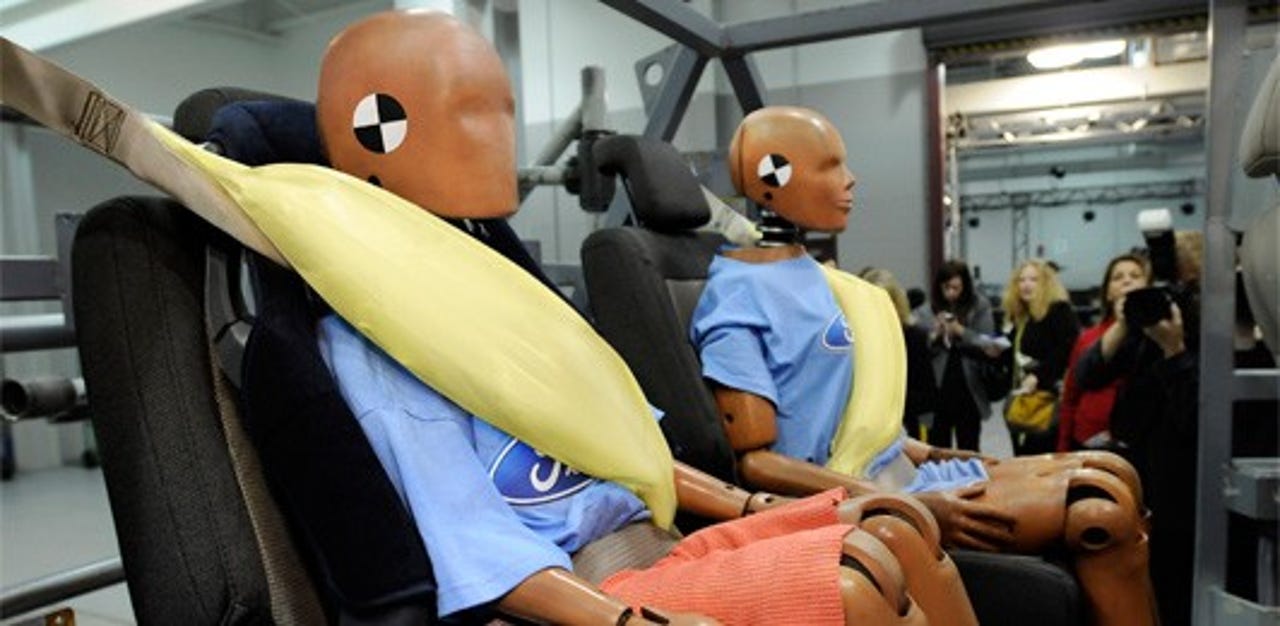Ford to use wearables to improve health and safety in cars


I interviewed three leaders at the Ford Research and Innovation Center in Dearborn, Michigan on Tuesday and all three of them were sporting a wearable device on both wrists. All three also talked about the expectations of coming wearable innovations from Google and Apple.
It was obviously no coincidence. Ford is serious about what wearables can do for cars.
Special Feature
"Things like wearables we see as a tremendous opportunity," said Gary Strumolo, Ford's Manager of Vehicle Design and Infotronics. "It eliminates one of the problems that we always felt in terms of how do we get biometric information from the driver... We want it to be continuous and transparent to the driver. Wearables [can] solve that problem."
Stromolo said Ford has considered a number of options for getting this biometric data from the driver in the past, including possible wristbands or headbands, but the company doubted that many drivers would wear them. However, the equation changes if people start voluntarily wearing health monitoring devices that Ford can connect to and integrate into the car's information systems.
"We see [wearable tech] as a great opportunity because people will wear it. We don't have to ask them to wear it. We don't have to build it into the car. As long as it has Bluetooth connectivity we can connect to it like we can connect to a phone, we can leverage our SYNC platform," said Strumolo.
"And then we can be intelligent about what we do inside the car as a result of that information. So if the driver is very stressed we might make recommendations going from the most research-y kind of thing of changing the music selection to calm the driver down to preventing phone calls from coming in and sending them direct to voicemail so they don't have to exacerbate the situation. We can do things if we know the condition of the driver."
Jim Buczkowski, Ford Technical Fellow and Director of Electrical and Electronics Systems, also emphasized that health monitoring can allow vehicles to better understand their drivers and adjust the way the vehicle reacts and relays information. Using heart rate monitors, the vehicle can tell if you're stressed. Using cameras or other sensors, it might be able to tell if you're tired.
"If you're very tired, if you appear very distracted, maybe we hold off on that phone call and [automatically] send a [text] message: 'call you back later'."
"If we can tell a little bit more about your state at any particular time, we can tune the vehicle -- [and] the information coming to you -- to your current conditions," said Buczkowski. "If you're very tired, if you appear very distracted, maybe we hold off on that phone call and [automatically] send a [text] message: 'call you back later'."
Stromolo speculated that this could help people with health challenges or chronic illnesses to be safer drivers. "Most people go through most of their driving lives without ever being in a serious auto accident," he said, "but they may have a chronic illness that they have [to deal with] every day. And so the question is can we deal with the needs people have on a daily basis and not on this rare occasion when [an accident] happens."
When we spoke with Stromolo in his office at Ford, he was wearing a Pebble smartwatch on one hand and a Basis smartwatch/fitness tracker on the other. When we went down to Buczkowski's office we found him wearing a Pebble on one hand and a Shine fitness tracker on the other. We also spoke with Venkatesh Prasad, Ford's Senior Technical Leader of Vehicle Design and Infotronics (also known as "The What's Next Guy" inside Ford) and he was also wearing a Pebble and a Basis.
However, when asked about what wearable ecosystems Ford is likely to support, they each articulated interest in three platforms: Pebble, Android, and iOS.
Buczkowski said they are asking themselves, "What do people really value about a Pebble watch? What can we anticipate they are going to really value in a Google device? ... And maybe Apple will introduce a device in the fall."
"Probably the No. 1 thing ... is the notifications [feature]," Buczkowski added. "I don't have to fish my phone out of my pocket if it buzzes. I can take a quick glance down to see if it's an important message or it's just the closing price of Ford stock or maybe it's a call from my wife... If [customers are] going to integrate this into their lifestyle because it has some value and if the value it has to their lifestyle is notifications, then how does that make sense in the vehicle?"
He said that's a question Ford is still grappling with, but the team is considering options like taking advantage of vibrating alerts to help drivers keep their hands on the wheel and their eyes on the road.
Ford vehicles don't currently offer any integration with any wearable platforms, but clearly it's coming. Buczkowski said the company will ultimately work to support all of the different wearables devices that are expected to hit the market in the coming years.
"The theme Ford started with SYNC and that will continue is that we want to be agnostic," he said. "We want you to make the choices. You make the choices and we'll try to work with the choices you make... Whatever's most appropriate or important to you, we'd like to bring it into the vehicle. And we'll do that to the extent we can. Some of that's going to involve standards and standardization... We may pick some partners to do some experimentation or kick things off."